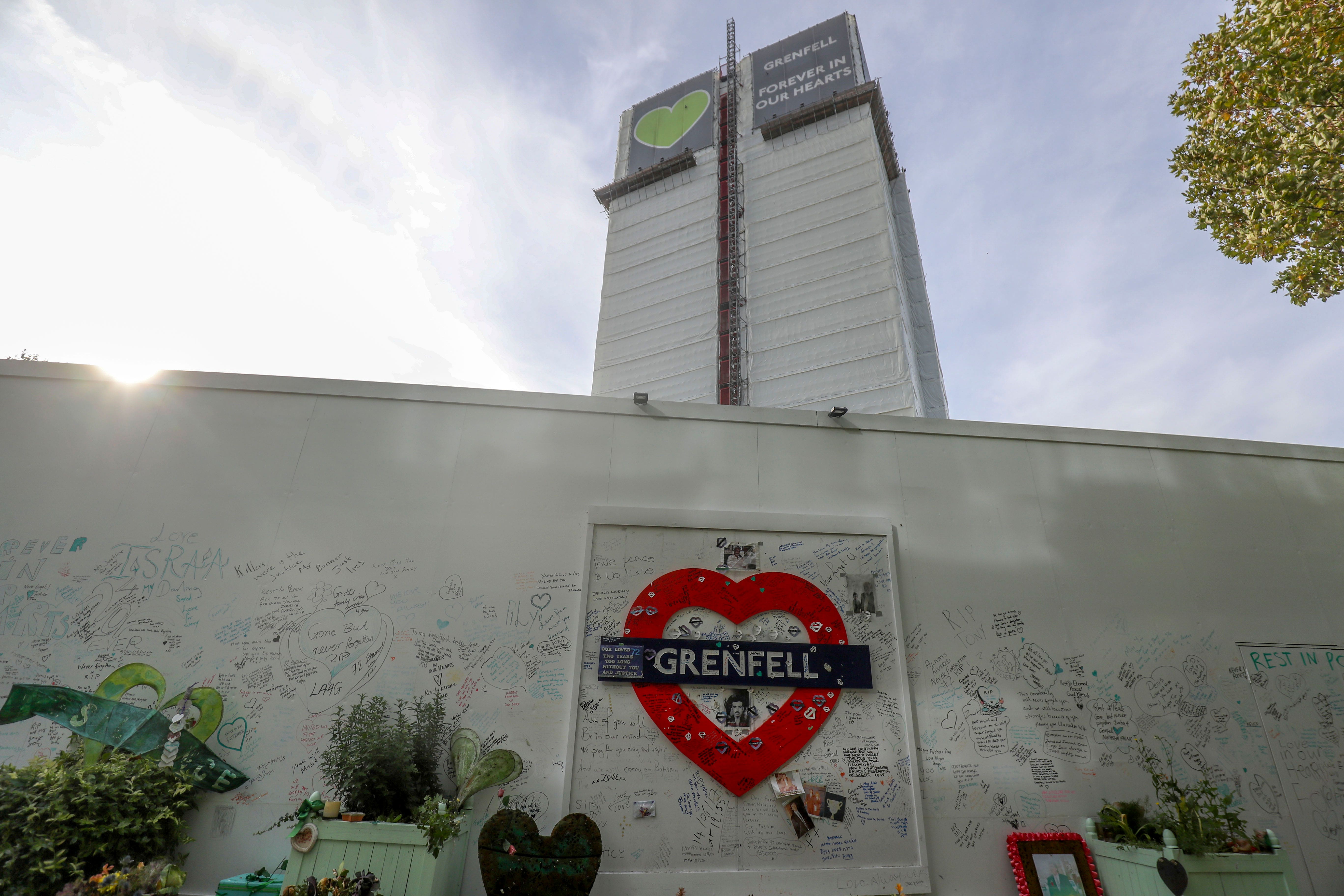Thousands trapped in flats with Grenfell-style cladding ‘scammed’ by insurers
Exclusive: Residents unable to sell homes in blocks built with cladding deemed ‘safe’ seven years after Grenfell fire disaster – as insurance companies accused of profiteering by hiking premiums by up to 1,000%
Thousands of residents trapped in homes with Grenfell-style cladding that they cannot sell are being “scammed” by insurers demanding unaffordable premiums despite being told the buildings are safe, The Independent can reveal.
Nearly seven years after the tragedy, which took place in west London in June 2017, residents living in cladded homes are seeing their insurance costs surge by up to 1,000 per cent.
One woman, whose one-bed flat where she lives with her baby was declared safe, saw her annual insurance bill soar from £247 to £2,626 in just two years – a tenfold increase. She told The Independent: “How far does this go before I literally can’t beg, borrow, pay it back? The sky’s the limit if no one else will touch us.”
Have you been affected by this? Email andy.gregory@independent.co.uk
Campaigners and politicians have condemned the situation, with Labour claiming that innocent leaseholders are being “scammed” by “exorbitant insurance costs”.
The Grenfell Tower fire, which spread from a faulty fridge on the fourth floor and rapidly engulfed the entire building, threw the issue of cladding into the spotlight, with 230,000 properties across the country subsequently identified as being covered in similarly dangerous material.
Tens of thousands of homes have since been deemed safe or stripped of the material. But insurance companies willing to insure these buildings have been accused of profiteering from the issue, while big-name insurers stay on the sidelines – hiking up prices.

The government is now being urged to financially back a long-awaited scheme, set up by the insurance industry, to try and cut costs. But critics say it is unlikely to make much difference as only a handful of insurers are taking part – and only then to help existing customers.
Labour MP Barry Gardiner told The Independent: “Leaseholders are being scammed once again. Why should innocent leaseholders trapped in high-rise blocks with fire safety defects have to pay out for the exorbitant insurance costs?
“These are a direct result of the negligence and incompetence of the development and construction sectors.”
As well as homes clad with flammable materials being costly – or impossible – to insure, properties where cladding has been judged to meet the new PAS 9980 safety standard are also facing skyrocketing premiums. Insurers insist they still need to charge more because the government measure of risk to life does not reflect the risk to the buildings themselves.
Stella Williams, who lives in a one-bed leasehold flat in Borehamwood, Hertfordshire, with her 11-month-old daughter, saw her annual insurance bill more than triple from £247 in July 2021 to £848 the following year.
Despite a report finding two months later that her five-storey building’s cladding met the government safety standard, identifying only the timber balconies as requiring remediation, Ms Williams’s insurance premium has now soared to an annual rate of £2,626.
Property managers FirstPort told her this offer – which includes a £10,000 excess for all risks, even a leak, rising to £100,000 for fire – was the only one they received for the two 36-flat blocks after approaching 22 insurance companies, at least eight of whom directly cited cladding when declining to make an offer.
“It’s now taking over my life – it’s just the fear of ‘what’s going to happen?’,” Ms Williams, a scientist who works in blood disorders, told The Independent. “What happens when we get a new bill in October?”

“I just feel really trapped,” said Ms Williams, aged 40, who purchased the one-bed flat using Help to Buy in 2016. “It does affect you – I want to be happy around my baby, I don’t want her to grow up with stress around her. But it’s really difficult.”
Questioning why the government’s standard of remediation is not good enough for insurers, Ms Williams said: “If the government really believe the risk is so low, then why can’t they underwrite my property?”
Ms Williams is far from alone in urging ministers to intervene, with the Association of British Insurers (ABI) itself among those calling for the government to back its new scheme.
When he was communities secretary in 2022, Michael Gove asked the City watchdog, the Financial Conduct Authority, to look into high insurance costs for flats. The FCA said in a report later that year that it found evidence of “some high commission rates” and that the supply of insurance had “contracted significantly”.
‘Too little, too late’
The ABI hopes insurance companies will use the new Fire Safety Reinsurance Facility to help shoulder the risk and bring costs down, said Mervyn Skeet, the ABI’s director of general insurance. But he was unable to say how much premiums could be reduced by.
Currently, just Allianz, Aviva, Axa, RSA and Zurich have agreed to the scheme, and only to reinsure existing customers who are still awaiting remediation works – a mere fraction of those potentially facing soaring bills.
Of the 230,000 properties with unsafe cladding in buildings taller than 11m, work has already been completed in 55,000 of these – meaning they will not be eligible for the scheme.

“It’s too little, too late – still no one can tell us how many people are going to be helped and what ‘good’ will look like. Too many people are ruled out of help,” said Giles Grover, of End Our Cladding Scandal, whose own premium is still up 400 per cent, even after three years of work to replace the risky cladding at a cost of £12m.
“Unfortunately, the government is resisting all calls to intervene. They’re still relying upon industry to turn around and stop ripping us off.
“It’s vital the Treasury agrees to back this scheme, otherwise they are continuing to profiteer from innocent leaseholders through the 12 per cent insurance premium tax.”
But Mr Skeet expressed hopes that ineligible buildings will still feel the benefit of improved market competition. The ABI also argues that government backing could further boost market confidence and encourage more firms to sign up.
He insisted his members were “applying the proper rating to the risk they believe they’re taking on”, arguing that the post-Grenfell revelations of shortcomings in building regulations had “significantly” increased the risks for insurers.
Mr Grover said: “They say they’re not extorting us, they’re basing it on risk. Well what were you doing before? ... You should have known. And if you didn’t know, you weren’t doing your due diligence.”
Martin Boyd, chair of the Leasehold Knowledge Partnership, added: “Insurance companies have done two things: put the premiums up, and the excesses too. I think that’s politely called double-dipping.”
Noting that “there is pretty obviously a correlation” between building resilience and fire safety, he pointed to figures showing just two of the 207 fire-related fatalities in residential properties over the year to September 2023 were high-rise buildings, despite firefighters responding to 707 blazes in these buildings.
“There is very little evidence – other than Grenfell – of big [fires in high-rises],” he said, adding: “If we want them to be as safe as modern buildings are built to now, then we need to demolish every single Georgian building in London, Bath, Edinburgh – wherever.”
A government spokesperson said: “Many leaseholders in buildings with identified fire safety issues have suffered from high premiums for too long. We will monitor the Fire Safety Reinsurance Facility and work with insurers to improve understanding of building standards to ensure this new facility brings real change.
“We are working with insurers to improve understanding of building standards. Where buildings comply with the relevant standards, insurers should offer affordable premiums without requiring additional remedial works.”
Join our commenting forum
Join thought-provoking conversations, follow other Independent readers and see their replies
Comments
Bookmark popover
Removed from bookmarks